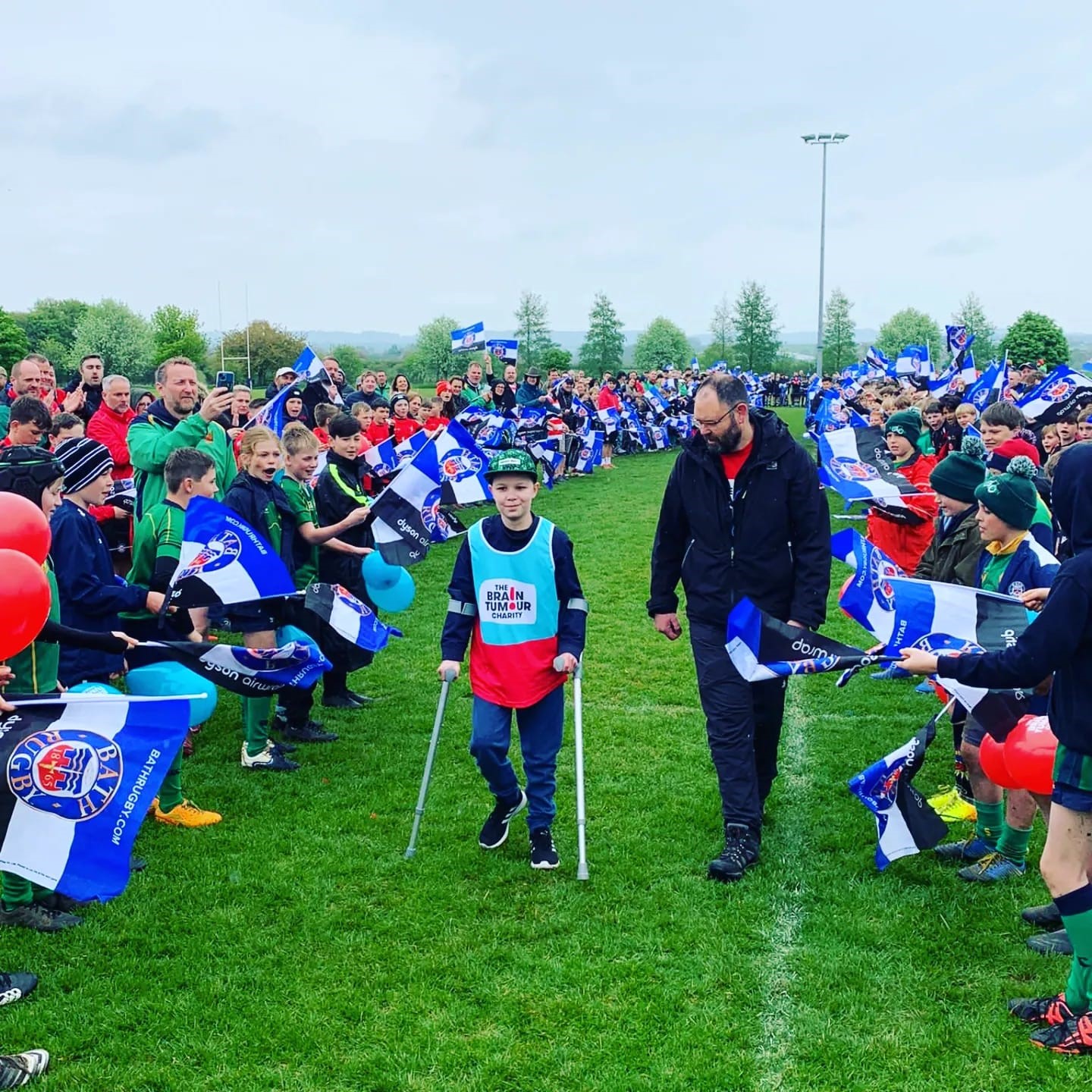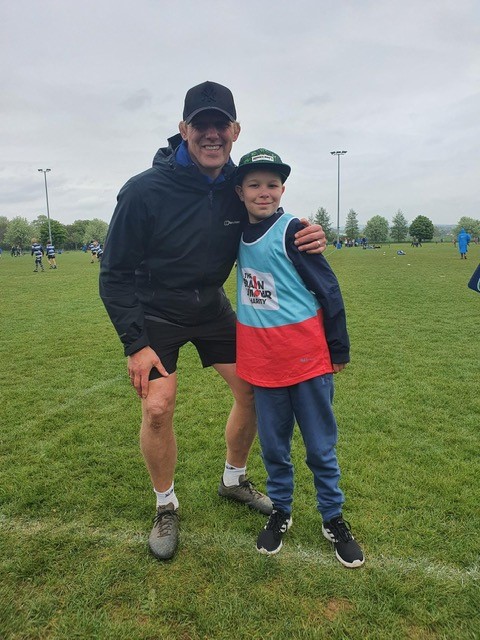Primary school pupil Will Alexander, from Gillingham, was diagnosed with a brain tumour during lockdown in 2020.
After his surgery and treatment, Will developed Posterior Fossa Syndrome, which caused him balance problems and weakness down one side of his body, and took away his ability to walk.
Now Will, who attends Wyke Primary School in Gillingham, is bravely learning to walk again, with the aid of physio and hydrotherapy.
Backed by North Dorset Rugby Club, where he played before his diagnosis, he is hoping to raise as much money as he can after taking on the challenge of walking 70 metres, the width of the Club’s rugby pitch. Will smashed his challenge on May 1 2022, in front of 32 teams cheering him on at the Bath Rugby Land Rover Rugby cup – as well as former-England Rugby Captain Lewis Moody! Will has now more than doubled his target of raising £5,000 for The Charity.
This is a remarkable achievement for Will, who, following his brain tumour surgery, was not even able to sit up in bed. But it’s a challenge he was determined to conquer, having already gone through months of gruelling treatment to aid his recovery. After a 10 hour initial surgery to remove the tumour, he spent six weeks on the neuro ward in Southampton.
He then underwent a course of radiotherapy to his head and spine at University College London Hospital. Four cycles of high dose chemotherapy treatment on the Piam Brown unit at Southampton Children’s Hospital followed. He even spent Christmas Day in hospital – and due to lockdown and isolation rules, had to spend a long time in his room every cycle.
Will’s Mum, Leah Alexander, said: “Will started being sick randomly during lockdown, which was initially put down to reflux. He then started having excruciating headaches and lacked energy which was then thought to be migraines. After referral to hospital, he was scanned and our worst fears came true. He was taken by ambulance to Southampton hospital late that night and operated on the next morning.
“Every day is hard for Will. The things we take for granted, such as standing up and walking, simple everyday tasks, spending a day at school catching up with a lot of missed work, are hugely challenging for him, not just physically but mentally.
“Since finishing chemo, Will does physio with us every day in the form of core strength exercises, stretches, stair climbing, squats etc. He has been on a week’s long course of intensive physiotherapy at Southampton hospital and does sessions of hydrotherapy at Dorchester hospital.
“He still suffers from fatigue, headaches and nausea following his treatment but nonetheless ploughs on every day.
“He has gone from simply learning to stand, to using a frame to walk a few steps, to now learning to walk with crutches.
“It was amazing and emotional to watch him take this on and complete this goal. As a parent, the whole journey has been stuff of nightmares, but seeing Will’s endless resilience and determination make us more proud than ever.”
“Will told me before he walked across the pitch that his heart was beating very fast, but he did a sterling job of keeping calm and had the biggest smile at the end of the pitch.”
“North Dorset Rugby Club, Bath Rugby Club and Bath Next Generation did Will proud in their incredible support for him. All the visiting teams, supporters and well wishers made for an electric atmosphere with flags waving, balloons and cheering!“

The family are grateful for the support of North Dorset Rugby Club, where Will was a regular player before his diagnosis, and Dad Neil was a coach.
The Club have thrown themselves behind Will’s fundraising drive, organising all sorts of activities, including a sponsored tree plant by Will’s team, the under 11s, with the under 10s also joining in by clearing woodland to earn money.
Neil says: “Will was an active member of North Dorset Rugby Club before he was diagnosed and loved playing there every week with his friends. We thought it would be good to set a goal alongside his learning to walk and combine the two with raising money for something very important to all of us.
“Alec Newing from the Club approached us asking how they could support us. Alec has been totally amazing in his endless support, enthusiasm and ideas for Will’s Walk and has spent a lot of time planning and making things happen at that end.
“The whole ethos of Will being part of their team and “one of us” has been hugely supportive, not just to Will, but to us as parents.
“As a parent of a child being diagnosed with a brain tumour, we know only too well the horrendous journey Will has been on. To learn that brain tumours are the biggest killer of children and people aged under 40 and how underfunded this type of cancer is, made us more determined to raise money and awareness and not let Will’s experience and continued challenges be for nothing.”
Their combined efforts are already paying off and incredibly, Will has now raised over £10,000 already – easily doubling his target of £5,000.
Will said: “I want to raise money for The Brain Tumour Charity because I would like to help others with brain tumours. What I’ve gone through was terrible, and I don’t want anyone else to feel that way.
“I have spent the last year learning to walk again which has been very hard, but I’m not giving up.
“I’m beginning to walk from nothing and have no strength in my legs and no balance. You have to use a lot of effort and energy to do it. I so want to be like how I was before and I believe everything will turn out that way, as long as you try your best.”

Kayleigh Lacey, The Charity’s Community Fundraiser for the South West, said: “We are blown away by Will’s bravery and resilience in setting himself this challenge, and sincerely thank him for working so hard to raise funds to benefit others.
“Brain tumours are the biggest cancer killer of the under 40s and, unlike other cancers, survival rates have not improved over the last 40 years.
“We are leading the way in changing this and truly fighting brain tumours on all fronts through our work.
“It’s through the efforts of people like Will and his family that we can change these shocking statistics in the future and bring hope to the thousands of people who are diagnosed with a brain tumour every year.”
